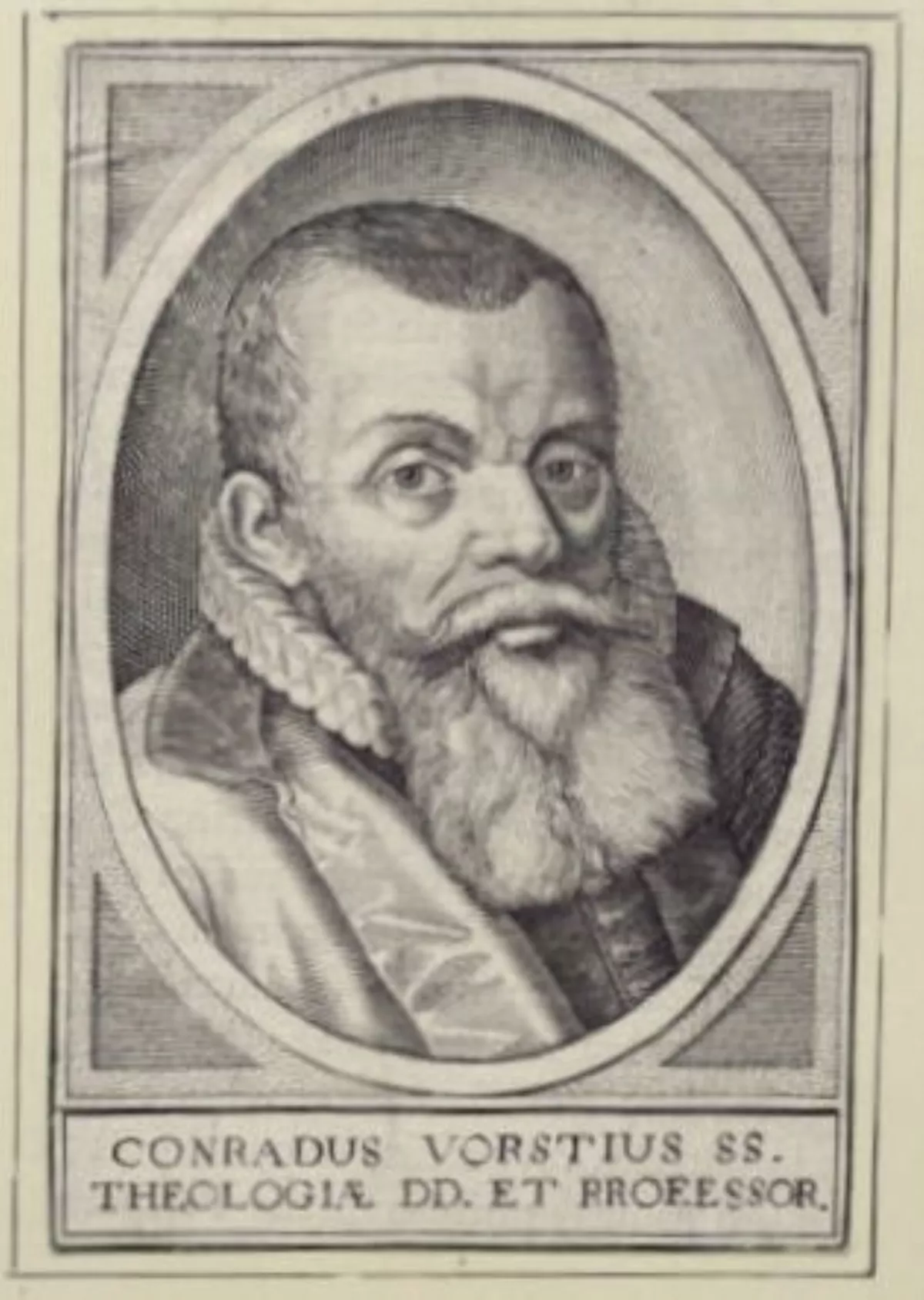 1.
1. Conrad Vorstius was a German-Dutch heterodox Remonstrant theologian, and successor to Jacobus Arminius in the theology chair at Leiden University.

 1.
1. Conrad Vorstius was a German-Dutch heterodox Remonstrant theologian, and successor to Jacobus Arminius in the theology chair at Leiden University.
Conrad Vorstius received the rudiments of his education at Bedburdyck for five years, before studying at Dusseldorf from 1583 to 1587, and at Aix-la-Chapelle.
Conrad Vorstius entered the college of St Lawrence in Cologne, where he should have taken his Bachelor's and master's degrees, but was unable in conscience to take the required oath of obedience to the decrees of the Council of Trent.
Conrad Vorstius had not neglected his Philosophical studies having often taken part in theological and philosophical disputations there.
Conrad Vorstius decided to return to his own country, and went instead to Burgsteinfurt in 1596, in the County of Bentheim where, thanks to a recommendation from Beza and David Pareus, he taught at Graf von Bentheim's Hohe Schule for fifteen years.
In Burgsteinfurt Conrad Vorstius defended the Reformed religion against the Catholic theologian Robert Bellarmine.
Conrad Vorstius received offers of teaching positions at Saumur and Marburg, but was unable or unwilling to leave the service of the Bentheims.
At about this time, by 1597, Conrad Vorstius married and embarked upon fatherhood.
Conrad Vorstius was "praised enthusiastically by indisputably orthodox divines at Heidelberg and Arnhem as worthy of the post".
Conrad Vorstius was a very troubling kind of academic, who could challenge fundamental tenets of scholastic theology.
Conrad Vorstius presented such arguments without endorsing them as points of belief, for example that the divine essence, if it had extent and magnitude, could not be infinite.
The appointment of Conrad Vorstius gave the opponents of Arminius the opportunity to make a political intervention in the name of the defence of the Christian religion.
Conrad Vorstius's teaching appeared heterodox and deeply sceptical, seeming to stray from Christianity, even from Theism altogether.
The publication of a suppressed work of Socinus, De Auctoritate S Scripturae, in 1611, in translation into Latin, provoked more severe condemnation, though Vorstius denied having imported Socinian works into the region, and claimed to have been ignorant of its authorship.
Conrad Vorstius appealed to freedom of understanding, and rather blamed Lubbertus for arousing interest in these questions by his attempting to suppress discussion of them.
Conrad Vorstius lodged official protests with the states of Holland and West-Friesland, and attempted to bring the Anglicans into his cause by communicating with the Archbishop of Canterbury and other English divines, inviting the intervention of King James I of England.
Conrad Vorstius first outlined the events that had aroused his opposition:.
Conrad Vorstius later sought to justify his intervention in this controversy in aliena republica as follows:.
James had Conrad Vorstius's books burned at London, and at Oxford and Cambridge.
Winwood's lengthy address to the Assembly at The Hague argued that the case against Conrad Vorstius's appointment was both political and religious: since some authorities opposed it, the appointment would threaten the unity of the Provinces.
Conrad Vorstius responded to the English condemnations in his Christiana ac modesta responsio, but the States-General felt obliged to dismiss him, though continuing his salary, in 1612.
Attacks on Conrad Vorstius continued, and he pleaded his own cause in a series of polemics.
Conrad Vorstius published a response to Piscator from Gouda in 1617, and another to the Contra-Remonstrant Festus Hommius in 1618.
The assault on Conrad Vorstius, still led by Lubbertus, led to his condemnation as a heretic, and the decree of his banishment, issued at the Synod of Dort.
King James I again applied considerable pressure through his delegates, and when it appeared that the synod did not intend to banish Conrad Vorstius he sent Sir Dudley Carleton in his name to the Prince of Orange in person to demand it.
Conrad Vorstius was stripped of his professorship and functions in the University of Leiden and given six weeks to leave Holland and West-Friesland.
Conrad Vorstius left Gouda and remained in hiding, mostly in the area of Utrecht.
At his funeral in Friedrichstadt the oration was read by Marcus Gualtherus, whose Book of Friendship Conrad Vorstius had inscribed in 1616.
Conrad Vorstius said of Vorstius's last years, that they were passed in constant moving from house to house to avoid discovery by his persecutors, always having to make sure there was a ladder so that he could escape through the upstairs windows.